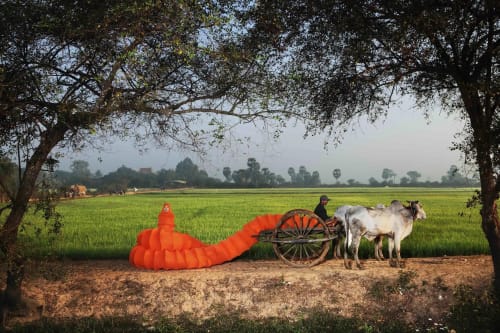Conditions for Performance in Cambodia: Interview with Anida Yoeu Ali
Anida Yoeu Ali (b.1974, Battambang) is an artist whose works span performance, installation, public encounters, and political agitation. She is a first generation Muslim Khmer woman born in Cambodia and raised in Chicago. After residing for over three decades outside of Cambodia, Ali returned to work in Phnom Penh as part of her 2011 U.S. Fulbright Fellowship. Utilizing an interdisciplinary approach to artmaking, her installation and performance works investigate the artistic, spiritual and political collisions of a hybrid transnational identity.
She is the 2015 Winner of the Sovereign Asian Art Prize, Asia’s most prestigious and longest running contemporary art award. Her artistic work has been the recipient of grants from the Rockefeller Foundation, Ford Foundation, the National Endowment of the Arts and the Illinois Arts Council. Ali earned her B.F.A. from University of Illinois (Urbana-Champaign) and an M.F.A. from School of the Art Institute Chicago. Ali is the co-founder of Studio Revolt, an independent artist run media lab whose works agitate the White House, won awards at film festivals, and redefines what it means to create sans-studio and trans-nomadically. Studio Revolt’s public performances and resulting images of Gallery X and Public Square were part of Our City Festival 2011 and 2012 (Phnom Penh). Ali’s The Buddhist Bug, a multidisciplinary work that investigates displacement and identity through humor, absurdity and performance, has been exhibited in Phnom Penh galleries, Singapore International Photography Festival, Malaysia Heritage Centre Singapore, Southeast Asia ArtsFest London, and featured at the 5th Fukuoka Asian Art Triennale where Ali participated as an artist in residence. Ali’s work has been in group exhibitions at the Asia Pacific Triennale at the Queensland Art Gallery (Brisbane, Australia), Palais de Tokyo (Paris, France), Musée d’art Contemporain (Lyon, France) in 2015. Ali’s artworks are included in private collections and the public collection of the Mainland Art Fund, Australia. Ali currently serves as an artist-in-residence at the University of Washington Bothell where she teaches performance, global studies and social justice courses.
Ali’s The Buddhist Bug, a multidisciplinary work that investigates displacement and identity through humor, absurdity and performance, has been exhibited in Phnom Penh galleries, Singapore International Photography Festival, Malaysia Heritage Centre Singapore, Southeast Asia ArtsFest London, and featured at the 5th Fukuoka Asian Art Triennale where Ali participated as an artist in residence. Ali’s work has been in group exhibitions at the Asia Pacific Triennale at the Queensland Art Gallery (Brisbane, Australia), Palais de Tokyo (Paris, France), Musée d’art Contemporain (Lyon, France) in 2015. Ali’s artworks are included in private collections and the public collection of the Mainland Art Fund, Australia. Ali currently serves as an artist-in-residence at the University of Washington Bothell where she teaches performance, global studies and social justice courses.
—
Annie: Could you please tell me a little bit about your training as an artist, and your performance work, and when you shifted from spoken word poetry to something that was focused on visual?
Anida: My performance background originated in poetry and rooted in text, and usually it is written original text, usually autobiographic text that is chronicling my family’s history and my personal struggle being raised in America and being someone who is considered bicultural. That started in 1998, with the formation of my spoken word group, “I was born with two tongues”. I was at the time the only Cambodian American in the poetry scene, the people of colour poetry scene, performance scene, the Asian American artist scene, so it was very lonely to identify as a Cambodian, and therefore a lot of my early formation was based on a pan-Asian American identity and looking at shared struggles and shared history as a political identity. That really informed a lot of my early works and trajectory.
And it wasn’t until 2005 that I had received an opportunity to come as part of the Mekong Project Artist Residency that was facilitated and hosted by Dance Theatre Workshop in NYC, and because I participated in the first version of the Mekong project in Chiang Mai, Thailand, they invited me again when it was hosted again in Phnom Penh, Cambodia. This was sort of a very big moment for me, because I had never come to Cambodia, ever, at that point, and it had been 30 years already. I left when I was 5, not by my choice, in 1979, when the borders were reopened, and the Khmer Rouge was ousted from power, my family left for the US and I was raised in Chicago. So at that time, it was just a really big deal for me to go back as an invited artist, someone with Cambodian ancestry, and as an artist, and to return alone, not with my parents, not with any family members, and with absolutely no obligation to do anything with family. And to completely be immersed amongst artists.

